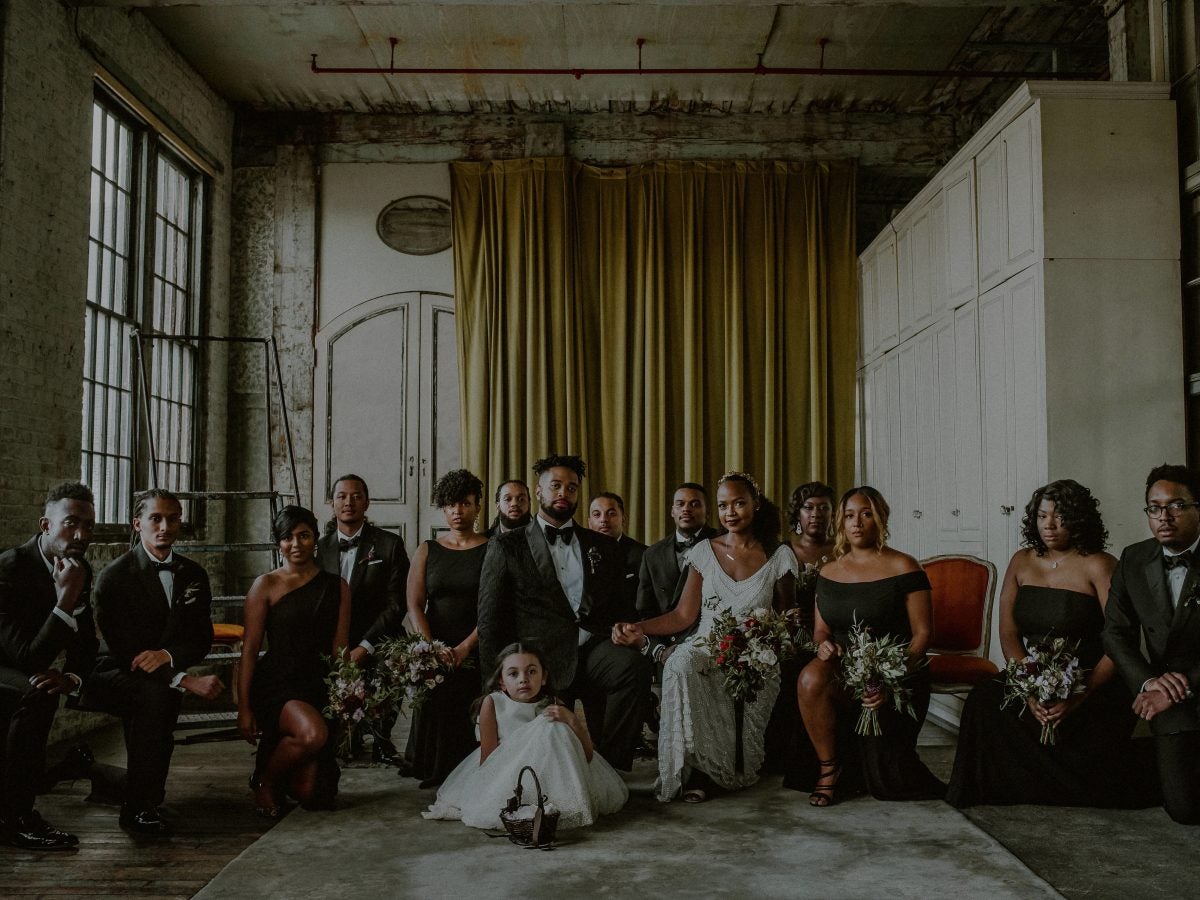

Each week for Black History Month, ESSENCE is highlighting stories of Black resistance in unexpected places.
Loving each other can be a revolutionary act in a society built on anti-Blackness.
Just in time for Valentine’s Day, ESSENCE sat down with three couples committed to social justice to discuss everything Black love and all the power it holds.
These interviews have been edited for length and clarity.
Former NYC Council Member Inez Barron and Council Member Charles Barron
Inez Barron, a retired principal and school teacher, had a second career in politics. She represented the neighborhood of East New York, Brooklyn as both a Council Member and State Assembly Member.
Her husband Charles Barron, to whom she has been married for almost 40 years, is a former member of the Black Panther Party and has also represented East New York as both its Assembly Member and Council Member, showing they are the definition of a (Black) Power Couple.
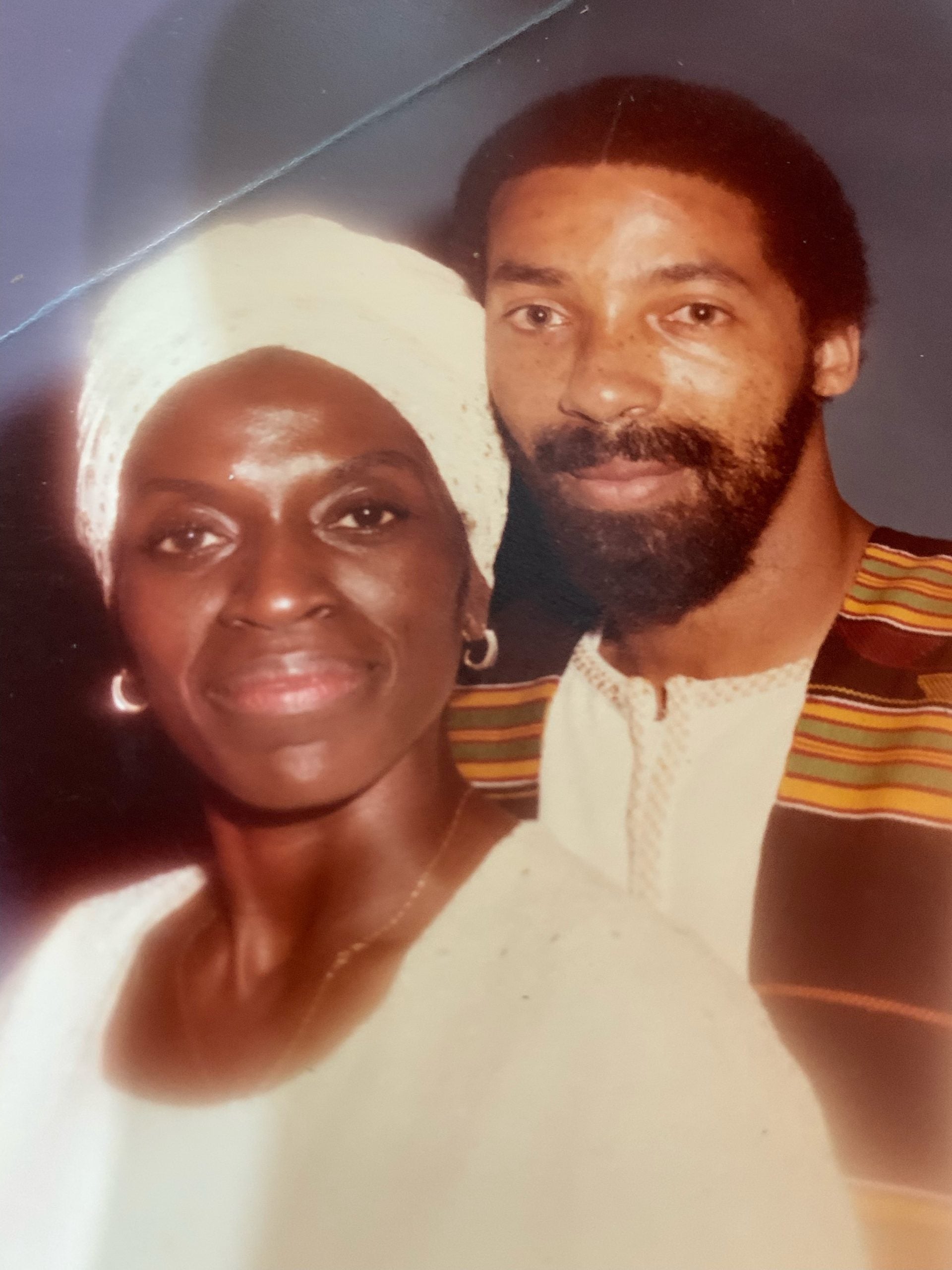
ESSENCE: How would you define your love?
Inez Barron: We define love in many ways. On our wedding invitations we said: “rooted in Africaness, founded in Christianity, and growing in love.”
It lets people know that we understand that we’re African. That’s our beginning. That’s our basis. That’s the foundation those are the roots. Everything starts from this. We talk about understanding our African culture, African history. And so that’s all beginning. Then we move from there.
Charles Barron: I would add to that, that what makes my love for Inez grow and be strong is her love for her people and our love for liberation. I think those were two main characteristics of love in a very practical sense, not just the emotional sense. Because when you really love yourself, you take care of yourself. When you love another person, that power and strength becomes stronger, because now you’re gonna take care of yourself and you want to protect and love a person. When you love your whole family, it’s even a more powerful love. And then can you imagine when you love your community and then love your people all over the world?
That’s the love of Malcolm X. That’s the love of Martin Luther King. That’s the love of Fannie Lou Hamer. The love of great leaders [like] Assata Shakur. The love of Black revolutionaries makes them powerful, because revolutionaries are motivated by love, not by hate.
Love is the essence, it’s the foundation of our power for liberation. And that Black love has to start with each one of us loving ourselves.
– Charles Barron
ESSENCE: How would you say that activism is rooted in your partnership?
Inez Barron: It was a continuation of what we each were doing in our separate venues of being involved in the struggle. It’s a part of my training [with] my parents bringing me up in the AME Zion church and being involved and being outspoken, and having my mom as an example of that. [My mom] Margaret Smith was also a firebrand. So it was a way of life for me.
Then by both joining and being members at the House of the Lord Church [where she met Charles]. That was the church that was in the leadership and at the fore of everything that was happening in [New York City] in terms of being in the struggle for liberation for Black people. This was just another dimension to continue what we were doing previously independently and then collectively through the church.
Charles Barron: Now Malaika you know I had to marry this sister, because I told her ‘I want to marry you, but you need to know this. You’re not going to be number one. Children are not going to be number one. God has called me to be a catalyst in the liberation of my people and that’s where most of time is going to be spent. Can you handle that?’ And when she said, “I know that!” For her to accept that, I knew I had to marry this sister.

Essence: What are you inspired by in your partnership?
Inez Barron: Alongside my mom, Charles is the greatest supporter of my work, my commitment, and the things that I do. You talk about a cheerleader, you talk about someone who you can bounce ideas off of. You talk about someone who gives you great critique and suggestions for how you could move forward. He’s just involved all the time in everything that I’m doing. So it’s easy to continue to inspire one another.
Charles Barron: Definitely ditto that. But you know what else I love about being with Inez? We have fun. There’s never a dull moment. When we’re in the community and we’re walking around, we hold hands and people look at us and say “oh, wow, you’re still holding hands after 40 years?”
When you come home from a hard day in the struggle, you want heaven in your home. And that’s what I have with Inez. Then, she always motivates me. I love her mind. She’s a brilliant thinker. Before I try to do certain things, I bounce it off Inez.
ESSENCE: Can you speak on the power of Black love and how it can be a form of resistance?
Charles Barron: Love is the essence, it’s the foundation of our power for liberation. And that Black love has to start with each one of us loving ourselves.
We’ve internalized hating ourselves. You cannot defeat a people who love themselves collectively. Martin Luther King’s Civil Rights Movement had to be founded in love. The Black Panther Party, our movement, it was based in love. Che Guevara and Huey Newton and Assata Shakur all said that what motivates them more than anything else is the love for our people.
Inez Barron: I’m thinking of Black love not being about resistance but as a mechanism of each of us achieving what we can individually to bring these gifts for the collective. We’re not doing this to resist; we’re doing this to help our people, to help us, and to magnify what our gifts are, and to bring a model of love to our children.
Arielle Reid and Dr. John Pamplin, II
Arielle Reid, a graduate of Columbia Law School, is supervising attorney of the Decarceration Project at The Legal Aid Society. Her husband Dr. John Pamplin, II is an assistant professor of epidemiology at Columbia University, primarily focusing on structural racism and its impact on mental health and substance use on Black populations and communities of color.
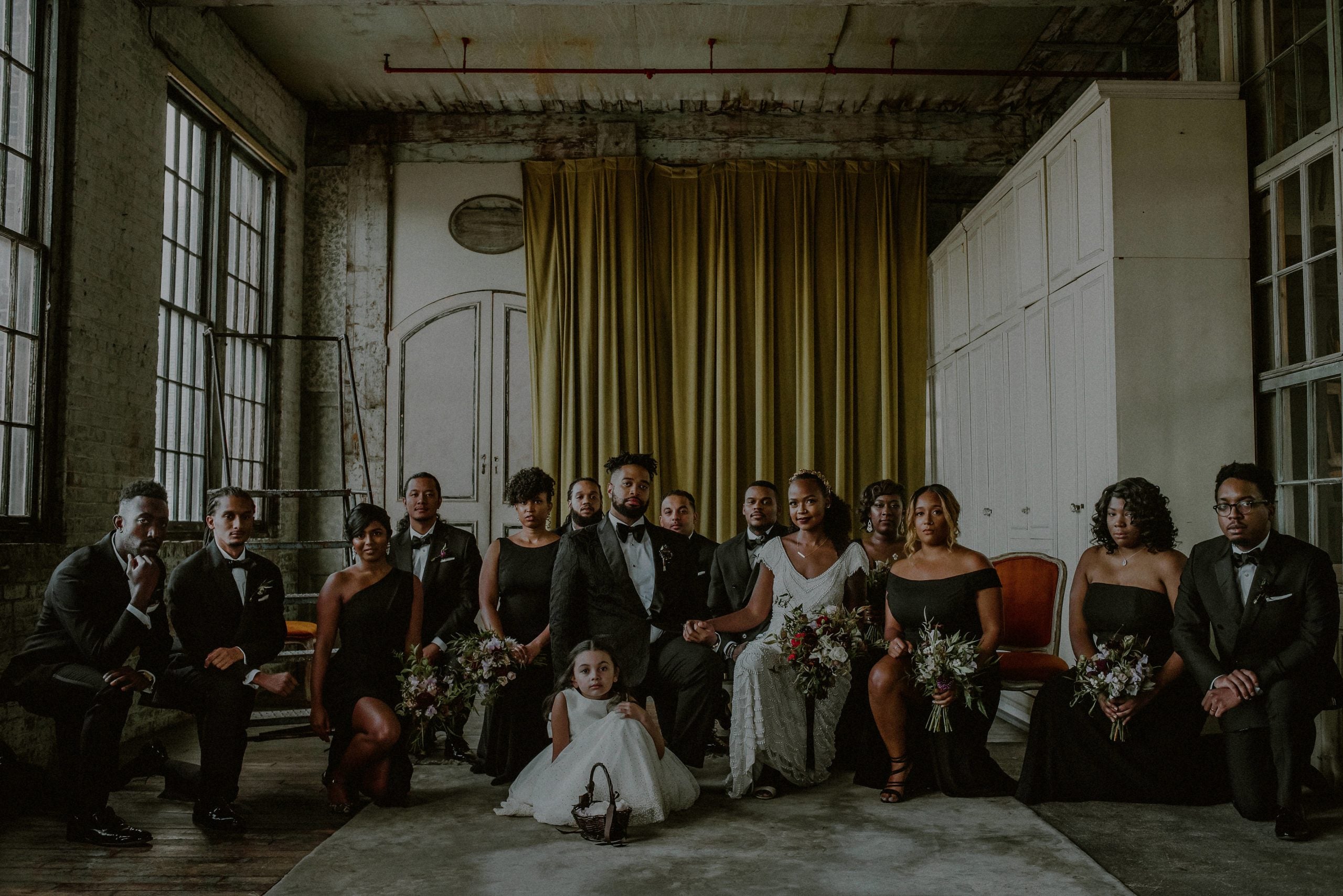
ESSENCE: How would you define your love?
Reid: Enduring and malleable because we’ve been together since we were basically not exactly kids, but right after college. We have gone through so much growth and change as a person, and I was able to grow with us as individuals, together.
Pamplin: Evolving. The thing that I reflect on the most is what our life looks like now is different than five years ago, 10 years ago. I think it’s a necessity because I would say both of us as individuals don’t look like what we did then, but we’re fortunate that our love has been able to evolve as we have evolved.
WATCH: Three Couples Who Prove There Is Power In Black Love
ESSENCE: How would you say that activism is rooted in your partnership?
Reid: For me, having that core devotion to community, that is bigger than both of us, it really grounds us as individuals and also us in relation to each other. We try to live those principles of community and collectivism and care and in our day to day relationship and interaction with each other the same way that we put them out into the world for the world that we envision.
We also push each other in this space. Because we’re both very driven by equity and by our political vision of the world, I think that allows us to bounce ideas off each other, push each other, challenge each other, and ultimately, both grow as a result as individuals and in a partnership. It makes a big difference being able to come home and have someone who can easily relate to what that is. I think we both do work in which our, you know, our professional work can have very personal change moments and we can relate [to one another on] a very meaningful level. It helps a lot in terms of just trying to deal with the day to day.
It’s so important to have a strong foundation built upon our shared humanity and shared background because so much of the world tells us that it doesn’t matter or shouldn’t matter.
– Arielle Reid
Essence: What are you inspired by in your partnership?
Reid: John is the first Black man to get a PhD from Columbia in his department. Having that and then choosing to do work that directly elevates community and shines a light on inequity when he could do anything is really inspiring for me, both as a partner, but also as an individual.
One of the many benefits of being on this path together is that we have similar interests and jobs, but we go about it in different ways. Being in a relationship with him and seeing his work makes me better at my job, and I hope that being with me and being able to tap into some of the stuff that I do makes him better at his job.
Pamplin: I was inspired to find my passion originally because of Arielle and her passion. Seeing how she moves in the world is something that’s inspiring for me.
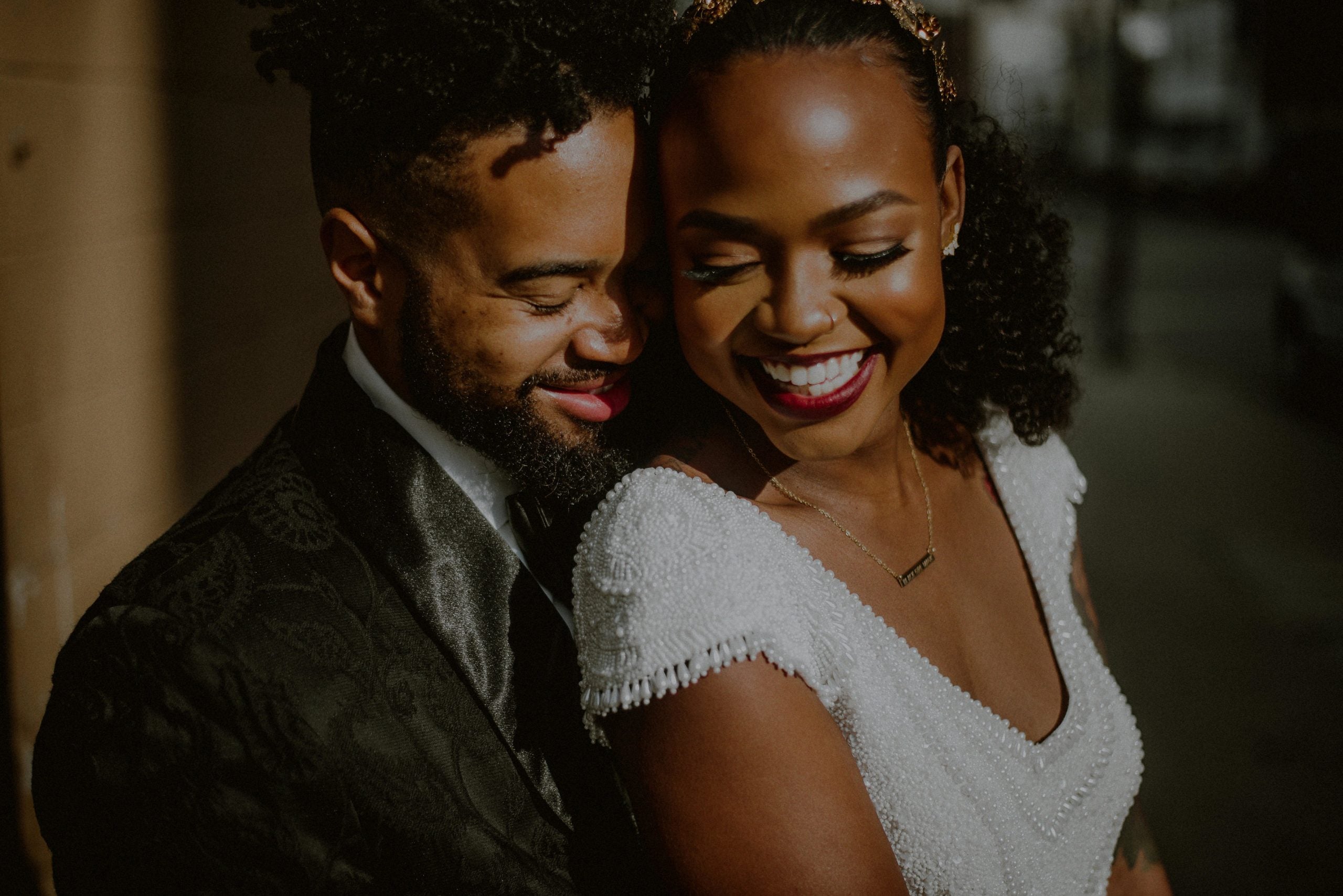
ESSENCE: Can you speak on the power of Black love and how it can be a form of resistance?
Reid: Yeah, we’re able to come home to each other as partners, both in life and in a broader struggle. Our shared experience and our shared history strengthens our activism, strengthens our sense of community and makes us more formidable. It’s so important to have a strong foundation built upon our shared humanity and shared background because so much of the world tells us that it doesn’t matter or shouldn’t matter.
I think that’s how we got here, that’s why we’re alive, that’s how we survived the centuries. Black folks have had to survive in this country by loving and clinging to each other when everything else was dying.
Pamplin: I think of our lives, individually and collectively, as kind of a love letter. I think that we both– whether it’s professionally, being committed to loving all black people, whether it’s personally– have chosen to live our life together, and Black love has fueled us through centuries of hate and harm, but it doesn’t get celebrated as such, and especially not in the quote unquote mainstream.
Reginald Cunningham and Brittany Packnett Cunningham
Reginald Cunningham is an activist, photographer, artist, and professor, and his wife Brittany Packnett Cunningham is Vice President of Social Impact at BET, an MSNBC and NBC News contributor, and award-winning podcast host.
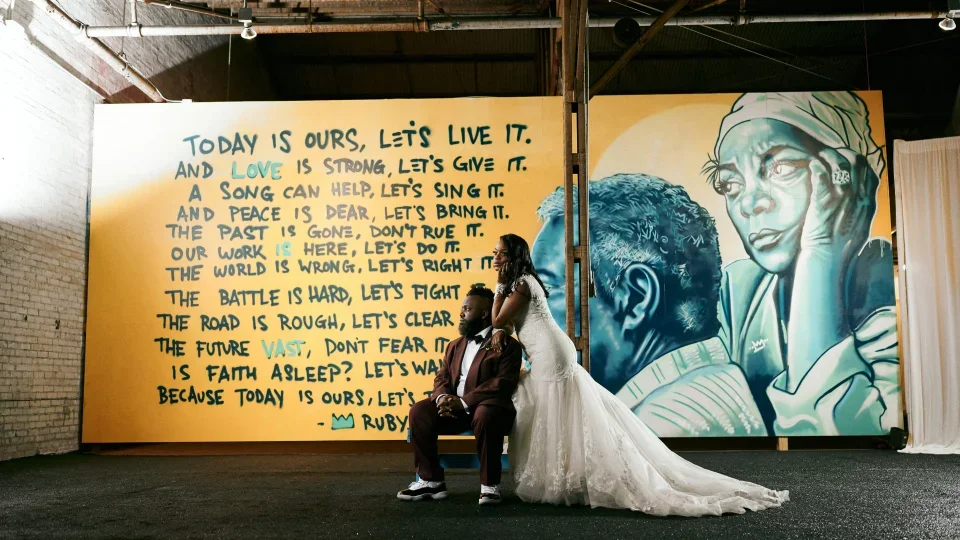
ESSENCE: How would you define your love?
Packnett Cunningham: I would define our love as freeing. I am grateful to be with a partner that I feel safe to be my full self with, to be with someone who lovingly challenges me and supports me to reach every single dream I didn’t even know I could have, and who is as committed to Black liberation individually as we are together.
Cunningham: I would have to say intentional. I think that the beginning of our relationship, we didn’t fall in love, we really chose this. We were intentional about all the work that we had to do, all the learning and unlearning that had to do in order to be able to effectively love each other, and so we have continued with that intention throughout the course of our relationship in terms of our communication and spending time together, especially now with a baby.
There are so many ways in which Black love stands in opposition to what white supremacy had ordained for us.
– Brittany Packnett Cunningham
ESSENCE: How would you say that activism is rooted in your partnership?
Packnett Cunningham: We met at a protest, so it literally is the root of our partnership, and I think that as we’ve grown as a couple, we’re constantly thinking through how we best use our gifts, our talents, and our blessings, both individually and collectively, to be a small part of what Black liberation can look like. We have the unique opportunity as a couple to do more together than we can apart, and I think that we try to take that really seriously.
Essence: What are you inspired by in your partnership?
Cunningham: I’m inspired by Brittany. I wouldn’t be a photographer if it wasn’t for her giving me permission to go and chase that that passion. I would also just add that we’re constantly and always inspired by our faith. Everything we do is God centered, we pray before we try to pray before we do anything.
Packnett Cunningham: I’m inspired by Reggie. I didn’t call myself a creative until I met him and realized that so many of the things I was dreaming up and ideating weren’t the creative pursuits, but I was afraid of entering an unconventional professional space.
He really helped me explore that side of myself and feel confident and rooted in those gifts. I’m also inspired by my own parents. My father passed when I was 12, but I feel very grateful that when he was alive I got to witness him and my mom be affectionate and loving and affirming toward each other in ways that set a bar for me, and thankfully I found somebody who meets and exceeds that bar.
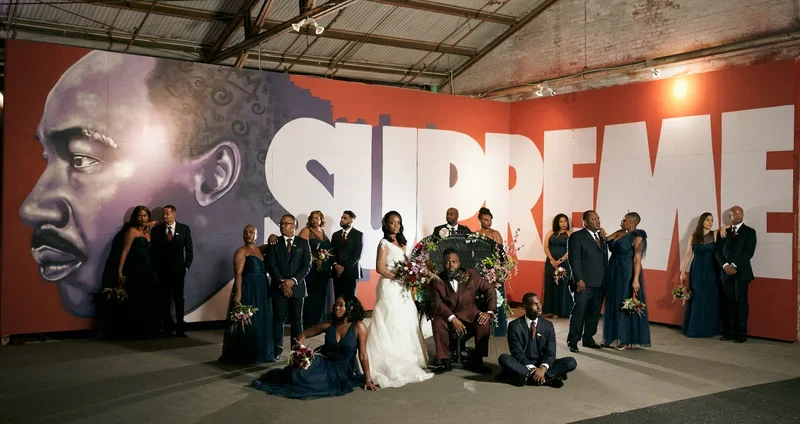
ESSENCE: Can you speak on the power of Black love and how it can be a form of resistance?
Packnett Cunningham: On my podcast, I got to have a conversation with one of my literary heroes, and I talked to her about something she wrote years ago that Black love is Black wealth. It keeps us strong, it keeps us holy, it keeps us sacred, it keeps us grounded, it keeps us powerful, it keeps us rich. I think that there are so many ways in which Black love stands in opposition to what white supremacy had ordained for us, and Black love is not only our wealth in that case, it is our greatest weapon against the tools of oppression.
Cunningham: Black love is a revolution because it’s not supposed to exist. Everything that white supremacy did was such that it wouldn’t exist, they destroyed our families. Black familial love, Black friendship and Black love in any form, they really tried to get rid of because they knew that’s what would break us, and that is what was everlasting that actually got us through and continues to get us through—the love that we have for each other.
Packnett Cunningham: If Black love between a man and a woman is revolutionary then we have to recognize just how much more revolutionary Black love is between queer people, gender queer people, gender queer Black people, people whose love is sometimes even frowned upon in our own community, even though we should know better because we know what it feels like to have our love restricted elsewhere. All Black people deserve the absolute world, all Black people deserve love.